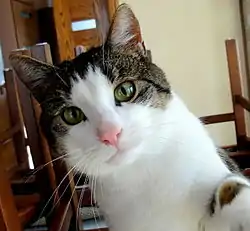گربه
Ottoman Turkish
Noun
گربه • (gürbe)
Descendants
- Turkish: gürbe
Further reading
- Çağbayır, Yaşar (2007) “gürbe1”, in Ötüken Türkçe Sözlük (in Turkish), volume 1, Istanbul: Ötüken Neşriyat, page 1808
- Devellioğlu, Ferit (1962) “gürbe”, in Osmanlıca-Türkçe Ansiklopedik Lûgat (in Turkish), Istanbul: Türk Dil Kurumu, page 357
- Kélékian, Diran (1911) “گربه”, in Dictionnaire turc-français, Constantinople: Mihran, page 1019
- Meninski, Franciszek à Mesgnien (1687) “Felis”, in Complementum thesauri linguarum orientalium, seu onomasticum latino-turcico-arabico-persicum, simul idem index verborum lexici turcico-arabico-persici, quod latinâ, germanicâ, aliarumque linguarum adjectâ nomenclatione nuper in lucem editum, Vienna, column 560
- Meninski, Franciszek à Mesgnien (1680) “گربه”, in Thesaurus linguarum orientalium, Turcicae, Arabicae, Persicae, praecipuas earum opes à Turcis peculiariter usurpatas continens, nimirum Lexicon Turkico-Arabico-Persicum, Vienna, column 3905
- Redhouse, James W. (1890) “گربه”, in A Turkish and English Lexicon, Constantinople: A. H. Boyajian, page 1535
Persian

Etymology
From Middle Persian [script needed] (gwlbk' /gurbag/, “cat”), from Proto-Iranian *wr̥pa-ka-,[1] ultimately from Proto-Indo-European *h₂wl̥pís.[2][3] Compare Lithuanian vilpišys (“wildcat”), Latin vulpes (“fox”). Perhaps anciently related to روباه (rubâh, “fox”); see there for more.
Pronunciation
Audio (file)
- (Classical Persian) IPA(key): [ɡuɾ.ˈba]
- (Dari, formal) IPA(key): [ɡʊɾ.bǽ]
- (Kabuli) IPA(key): [ɡʊɾ.bǽ]
- (Hazaragi) IPA(key): [ɡuɾ.bǽ]
- (Iran, formal) IPA(key): [ɡ̥oɹ.bé]
- (Tajik, formal) IPA(key): [ɡuɾ.bǽ]
| Readings | |
|---|---|
| Classical reading? | gurba |
| Dari reading? | gurba |
| Iranian reading? | gorbe |
| Tajik reading? | gurba |
Noun
| Dari | پشک |
|---|---|
| Iranian Persian | گربه |
| Tajik | гурба, пишак |
گُرْبِه • (gorbe) (plural گربهها (gorbe-hâ) or گربگان (gorbegân))
- cat
- c. 1060, Nāṣir-i Khusraw, Safarnāma [Book of Travels]:
- و آن جا زنان را علتی میافتد به اوقات که چون مصروعی دو سه بار بانگ کنند و باز به هوش آیند و در خراسان شنیده بودم که جزیرهای است که زنان آن جا چون گربگان به فریاد میآیند و آن بر این گونه است که ذکر رفت.
- w-ān jā zanān rā ilatē mē-uftad ba awqāt ki čōn masrū'ē du si bār bāng kunand u bāz ba hōš āyand u dar xurāsān šunīda būdam ki jazīra'ē ast ki zanān ān jā čōn gurbagān ba faryād mē-āyand u ān bar īn gōna ast ki zikr raft.
- And there, a disease comes upon women from time to time so that they cry out like an epileptic two or three times, then return to sanity again. And in Khurasan, I had heard that there is an island whose women scream like cats. That is the same sort of thing as what has been mentioned.
References
- Cathcart, Chundra A. (2022) “Dialectal layers in West Iranian: a Hierarchical Dirichlet Process Approach to Linguistic Relationships”, in Transactions of the Philological Society, volume 12, number 1,
- De Vann, Michiel (2000) “The Indo-Iranian animal suffix *-āćá-”, in Indo-Iranian Journal, volume 43, number 3,
- Holopainen, Sampsa (2019) Indo-Iranian Borrowings in Uralic: Critical overview of the sound substitutions and distribution criterion, University of Helsinki (PhD)
This article is issued from Wiktionary. The text is licensed under Creative Commons - Attribution - Sharealike. Additional terms may apply for the media files.